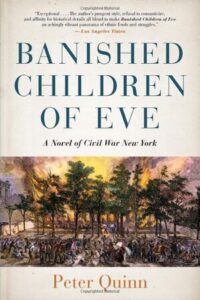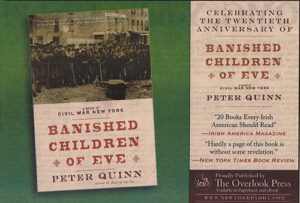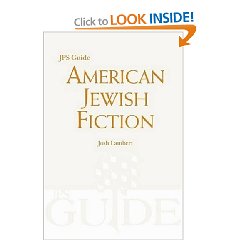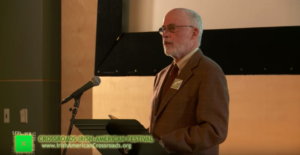Peter Quinn: Banished Children of Eve: A Novel of Civil War New York
December 10, 2021 by David
Filed under Fiction, WritersCast
 Banished Children of Eve: A Novel of Civil War New York – Peter Quinn – Empire State Editions (Fordham University Press) – 978-08232-9408-4 – 612 pages – paperback – $17.95 (eBook version is not available for this title)
Banished Children of Eve: A Novel of Civil War New York – Peter Quinn – Empire State Editions (Fordham University Press) – 978-08232-9408-4 – 612 pages – paperback – $17.95 (eBook version is not available for this title)
Historical novels based in New York City have always appealed to me. I am not sure why. Maybe it has something to do with the time I spent with my grandparents, who lived in New York City, took me frequently to the Museum of the City of New York, and showed me many of the historical sites of the city. Maybe it is simply because so much of American history is the history of that great city.
I picked this book to read while browsing a bookstore for the first time since the pandemic began. Book discovery is a wonderful thing, and something many of us have missed. There are occasions when a book seems to jump off the shelf and into your hands, drawn there by some mysterious bookstore magic. Sometimes those discoveries are serendipitous and that was definitely the case with this novel. It was not the only book I bought that day, but it jumped my queue and I devoured the book in a way that reminded me of my youthful nights under the covers reading by flashlight.
Banished Children of Eve is one of those longish historical novels that is a joy to immerse oneself in. It is a great story about a dramatic time and place, with terrific well-drawn characters and a great story unfolding in multiple voices. And even the minor characters are brought to life by Quinn’s sympathetic descriptions.
The story takes place in 1863 when the Civil War is its third bloody year and the Union, having exhausted its volunteer army, has been forced to impose the first military draft. In New York City, where this book is set, that is a fateful decision, one that will set off the worst urban riot in American history. The cast of characters created by author Quinn represents every element of New York’s cultural community including an Irish-American hustler, a dishonest Yankee stockbroker, a young immigrant serving girl, a beautiful mixed-race actress and her white lover (a struggling minstrel). Surrounding these main characters are a number of historical, real-life characters we recognize, including the Union General George McClellan, Archbishop “Dagger John” Hughes and even the songwriter Stephen Foster.
All come together in the emerging disaster of the Draft Riots, bringing to life a period in American history that is certainly less well-known to most Americans than the more often told stories of battles and national politics of our war-torn country.
William Kennedy’s description of Peter Quinn pretty much sums up how I feel about this book: “Peter Quinn takes history by the throat and makes it confess.” That is perhaps one of the greatest book blurbs ever, by the way.
Quinn is a natural storyteller, and if you are not familiar with this incredible period in American history, I recommend you get a copy of this book immediately and dive in. You will be amazed and thrilled to read this book.
Talking to Peter was great fun for me. We certainly could have gone on for hours. I hope you enjoy our conversation as much as I did.
Quinn was the chief speechwriter for Time, Inc. and retired as corporate editorial director for Time Warner at the end of 2007. He received a B.A. from Manhattan College, an M.A. in history from Fordham University and completed all the requirements for a doctorate except the dissertation. He was awarded a Ph.D., honoris causa, by Manhattan College in 2002.
In 1979, Quinn was appointed to the staff of Governor Hugh Carey as chief speechwriter. He continued in that role under Governor Mario Cuomo.
Originally published in 1994, Banished Children of Eve won a 1995 American Book Award. Hour of the Cat, set in Berlin and New York on the eve of WWII, was published in 2005, a nonfiction collection, Looking for Jimmy: In Search of Irish America was published in February 2007. His third novel, The Man Who Never Returned is based on the still-unsolved 1930 disappearance of NYS Supreme Court Justice Joseph Force Crater, published in 2010.
Quinn co-wrote the script for the 1987 television documentary McSorley’s New York, for which he won an Emmy. He appeared in several PBS documentaries, including The Irish in America, New York: A Documentary Film, and The Life and Times of Stephen Foster, as well as the dramatic film, The Passion of Sister Rose. Quinn was an advisor on Martin Scorcese’s film Gangs of New York, the story of which precedes and in some ways underpins Banished Children of Eve.
Quinn was the editor of The Recorder: The Journal of the American Irish Historical Society from 1986 to 1993 and has published articles and reviews in the New York Times, Commonweal, America, American Heritage, the Catholic Historical Review, the Philadelphia Enquirer, the L.A. Times, Eiré-Ireland, and other newspapers and journals.
Quinn is also president and co-founder of Irish American Writers & Artists.
You can buy Banished Children of Eve at Bookshop.org
Podcast: Play in new window | Download
Josh Lambert – American Jewish Fiction
 978-0-8276-0883-2
978-0-8276-0883-2
The Jewish Publication Society, $18.00
paperback original
Writerscast host David Wilk interviews Josh Lambert, the editor of AMERICAN JEWISH FICTION: A guide to great novels and short story collections published in January 2009 by the Jewish Publication Society. In the book, Lambert collects and discusses 125 classic American Jewish novels and short story collections beginning with Nathan Meyer’s DIFFERENCES from 1867 through Michael Chabon’s THE YIDDISH POLICEMEN’S UNION of 2007. In this fascinating interview, Lambert talks about his method for assembling his anthology, as well as some of the books and stories that it features. Wilk and Lambert talk extensively about the nature of Jewish fiction in America, themes that have remained constant over time, as well as what has changed in the American Jewish experiences since the earliest novels of the 19th century. Lambert talks about some of the issues he faced in making selections for the book and his enthusiasm for the many books he read in order to put this book together. AMERICAN JEWISH FICTION offers readers many surprises and should be of interest to any reader of contemporary fiction.
Podcast: Play in new window | Download

